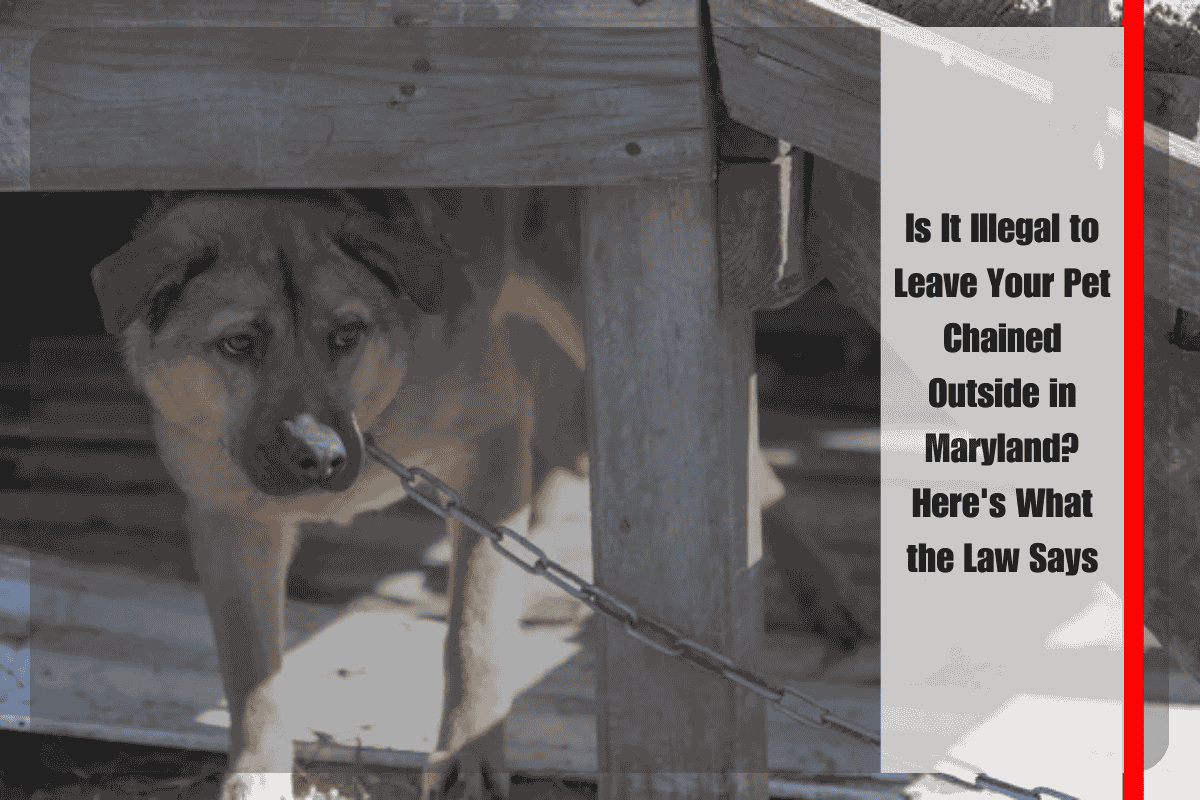Leaving pets chained outside can be a controversial and concerning practice. Many pet owners may not realize the legal implications of leaving a pet chained outside for extended periods. In Maryland, the law has been evolving to better protect animals, particularly in situations where animals are left outside without proper care or shelter. If you’re a Maryland resident or pet owner, it’s important to understand the legal boundaries and responsibilities regarding this practice.
Maryland’s Animal Cruelty Laws and Chaining Pets
In Maryland, leaving a pet chained outside is not automatically illegal, but there are significant regulations in place to protect animals from cruelty and neglect. According to Maryland’s animal cruelty laws, it is illegal to treat animals in a way that causes them unnecessary pain or suffering. This includes neglecting their basic needs, such as shelter, food, water, and adequate care. Chaining a pet outside for long periods of time, particularly without adequate shelter, water, or protection from extreme weather, could be considered a form of neglect and cruelty under the law. In some cases, it could lead to charges of animal cruelty. Maryland’s laws have specific provisions that aim to prevent the mistreatment of animals through improper confinement, which includes chaining or tethering them for excessive periods.
Maryland’s Tethering Law: What You Need to Know
Maryland passed legislation to address the issue of tethering animals outside. Under the state’s tethering law, it is considered illegal to leave a dog chained or tethered outside for long periods. The law specifically states that it is unlawful to leave a dog outside for more than 30 minutes during extreme weather conditions, which includes extreme cold (under 32°F), extreme heat (over 90°F), and severe weather conditions such as thunderstorms, hurricanes, or blizzards. If a dog is left outside for extended periods in such conditions, it can be classified as cruelty to animals, and the owner could face legal consequences, including fines, animal seizure, or imprisonment. This law was passed to ensure pets, especially dogs, are not subjected to dangerous conditions, and they are provided with humane treatment.
Proper Conditions for Tethering Pets
While Maryland does allow tethering pets, the law emphasizes that it must be done humanely. For example, if a pet is chained or tethered, the owner must ensure that the pet has access to adequate shelter to protect them from the elements, food and water that are readily available, and the ability to move in a way that is not restrictive or harmful to the animal. Chaining a dog or other pet for long periods in a way that restricts their movement, or leaving them outside without the necessary shelter and resources, is considered animal cruelty.
Penalties for Violating Maryland’s Animal Cruelty Laws
If a pet owner is found guilty of neglecting or mistreating their animal by chaining them outside under dangerous conditions, they could face serious legal consequences. Penalties for animal cruelty can include fines, criminal charges, animal seizure, and jail time in extreme cases. Carrying out these acts of cruelty can lead to charges that can range from a misdemeanor to a felony depending on the severity of the mistreatment.
How to Protect Your Pet: Best Practices for Tethering
To ensure you’re in compliance with Maryland’s animal welfare laws and to keep your pet safe, here are some best practices for tethering: limit tethering time by avoiding leaving your pet chained for long periods, especially in extreme weather conditions. Always provide shelter to ensure that your pet has access to shade or protection from the elements. Make sure to provide fresh water and food whenever your pet is tethered outside and regularly check on them to ensure their comfort and safety.
In Maryland, leaving a pet chained outside is not necessarily illegal, but it can be if the pet is subjected to neglectful conditions or extreme weather. Maryland’s laws are designed to protect animals from abuse and mistreatment, and improper tethering could result in serious consequences. It’s important for pet owners to understand the legal and humane practices surrounding pet care, including tethering, to ensure they are treating their animals with the respect and care they deserve.
Sources
[1] https://www.peta.org/issues/animal-companion-issues/ordinances/maryland/
[2] https://www.animallaw.info/topic/table-state-dog-tether-laws
[3] https://law.justia.com/codes/maryland/2013/article-gcr/section-10-623/
[4] https://www.peta.org/issues/animal-companion-issues/ordinances/maryland/tethering-montgomery-county-maryland/
[5] https://codelibrary.amlegal.com/codes/montgomerycounty/latest/montgomeryco_md_comcor/0-0-0-2512












